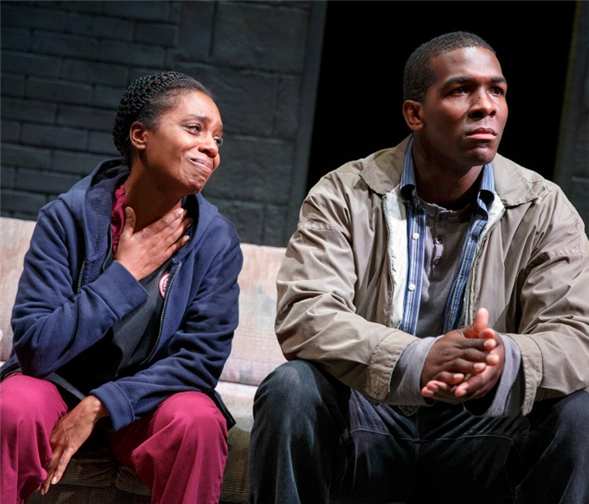Translate Page

Khris Davis' gut-wrenching physical transformation gets at the heart of Lynn Nottage's new play Sweat
---
Welcome to Building Character, TDF Stages' ongoing series on actors and how they create their roles
When Khris Davis read Pulitzer Prize-winning playwright Lynn Nottage's Sweat, which opens this week at the Public Theater, he immediately felt a kinship with the characters. He may never have been to the poorest city in the nation, Reading, PA, where Nottage collected the real-life stories that inspired her searing new drama about the death of economic stability for a tight-knit blue-collar community. But he was sure he knew the town and its downtrodden residents just the same.
"Growing up in Camden, NJ and as a young man in Philadelphia trying to figure out my way as an actor, I worked in factories," Davis says. "At one, I would open bread packets and put them on a belt where they would go into a grinder to make breadcrumbs. I knew I had a lot in common with my character, Chris. Then I got an opportunity to hear Lynn talk about all of these characters and what happens when your livelihood is taken away. That's when it dawned on me: These are my uncles and my aunts, people I can completely relate to because I come from a working-class city and family."
Happily his parents, both pastors, supported Davis' childhood dream to do something different: become an actor. His mother even penned plays for him to perform at their church. "There was no real way for me to do theater," he says. "Nothing like having your first experience onstage be at your church in front of a very supportive audience!"
After graduating with a theatre arts degree from Cheyney University of Pennsylvania, Davis worked steadily at regional companies before making an auspicious New York City debut earlier this year in the boxing drama The Royale at Lincoln Center. For his imposing turn as a colossal and charismatic, early 20th-century, African-American boxer, Davis snagged an Obie Award and a Theatre World Award. Though the character of Chris isn't a pro athlete, he's still a striking physical presence in Sweat. The nonlinear plot ping-pongs between 2000, when Chris is an idealistic young factory worker hoping to save enough to go to college, and 2008, when he's been released from prison for a crime that serves as the play's climax. In the chronologically earlier scenes, Davis bounds around the local bar where most of the action is set with a megawatt smile and the energy of a toddler hopped up on candy. In the after-incarceration sequences, his hunched body seems to be sinking into the floor. It's a heartbreaking transformation that serves as a potent reflection of the narrative arc as this once-vibrant, multicultural community fractures under the weight of lost opportunity.
Initially, Davis approached Chris' post-confinement physicality differently. "My first thought was, he has been to prison so he would be working out, but I came off dangerous and that didn't work for the emotional space that Chris needs to occupy," he says. "So I had to bring his shoulders in and feel the weight of what it was like to be in prison for eight years. I watched 13th [Ava DuVernay's recently released documentary examining race and the United States criminal justice system] and heard about Kalief Browder, who was sent to prison for something he didn't do and ended up committing suicide. What does that kind of anxiety do to someone? What kind of mental state would that person be in after prison? Everyone doesn't come out of prison like they ran the show! They got hurt in there and experienced some crazy things and have to come out into a society that will shun them. Chris becomes an invisible man to this country. That's why his physicality is more hampered and heavy and slower."
Davis isn't the only cast member who looks metamorphosed by the end of the show. According to the director, Kate Whoriskey, when the actors emerge for curtain call, they all look like "we've been beaten up!" Davis says. "Well, it's true. We're all trying to do honest work and that means we have to feel the pain of it, the loss, you know? The struggle, the addiction, the forgiveness, the shame."
Sweat is the latest in a string of complex dramas such as Skeleton Crew and The Humans exploring the impact of income inequality and the reshaping of class in this country. With a high-stakes presidential election just days away, it's a subject no one seems to be able to stop talking about -- including Davis. "There are these people who live in the woods in Reading; we have them in Camden, too," he says. "We call them tent cities. My parents do a lot of outreach, giving food and clothing. With this current election, there's a lot to lose. Factory workers were middle-class people when NAFTA was signed. All of a sudden the businesses were gone and they had nothing. No education. What could they do? What happens when it's not just these small towns but New York City and Chicago and other big cities that are affected? What happens when there is no more middle class? It's a devastating piece."
---
Follow Raven Snook at @RavenSnook. Follow TDF at @TDFNYC.
Photos by Joan Marcus. Top image: Michelle Wilson and Khris Davis.
TDF MEMBERS: Browse our discounted tickets to theatre, dance, and concerts.